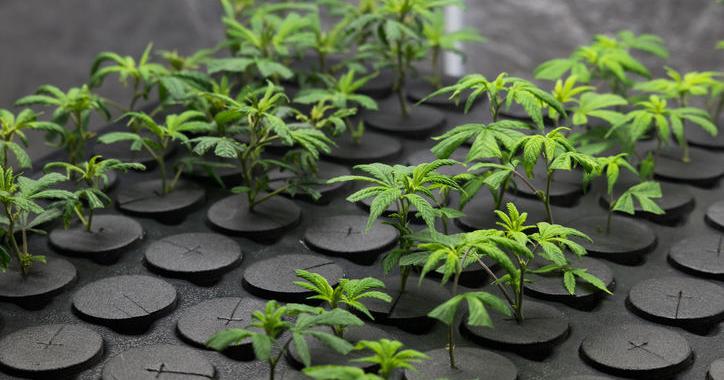Lawmakers seek to extend ban on new weed companies until 2025 | 406 Politics
On Tuesday, state lawmakers and industry trade groups threw their support behind a new proposal to extend Montana’s moratorium on new recreational cannabis businesses through 2025.
The move could shield Montana’s former marijuana suppliers from an oversaturated market and simultaneously address concerns among conservative lawmakers about dispensaries crowding the state’s main streets. The changes are proposed by an interim legislative committee; they would have to go through the 2023 legislature and the governor’s office to become law.
The current 18-month moratorium on new recreational cannabis suppliers, put in place by the 2021 legislature, is due to expire in June 2023. This was an extension of the 2020 Ballot Measure Montana Voters Passed to usher in the legalization of recreational marijuana, which contained a one-year ban on new licenses. The intention is to give existing Montana marijuana suppliers time to implement the market and new regulations before “Big Weed” begins to flood the state.
People also read…
Senator Jason Ellsworth, a Republican from Hamilton who played a leading role in crafting the state’s regulatory framework in 2021, was the one to suggest the extension as the interim Economic Affairs Committee considered its bill suggesting changes to Montana’s cannabis laws.
“We have a year and a half in this program,” Ellsworth told the committee on Tuesday. “It gives us more time to see how these changes take effect.”
Ellsworth added that he doesn’t think Montana needs to issue more cannabis licenses than it already has.
“That’s just my opinion,” he said.
Sarah Thomas of The Higher Standard in Missoula stocks marijuana products in December as the store prepares for the start of recreational sales in Montana.
TOM BAUER, Missoulian
The two largest industry groups in the state, the Montana Cannabis Industry Association and the Montana Cannabis Guild, have both expressed support for the measure.
Montana Cannabis Guild CEO JD “Pepper” Petersen, who was an architect of the 2020 ballot initiative, told the committee that cities and counties are still navigating the industry’s place in their communities with their own local measures. Additionally, the Department of Revenue’s Cannabis Control Division, which oversees the industry, is still making administrative changes, a process that is essentially on hold until the end of the 2023 legislature.
Ending the moratorium too soon could allow “large and powerful interests with teams of lawyers” to drive state regulatory reforms, rather than local stakeholders, Petersen said.
Some lawmakers expressed hesitant support for the extension, mostly uneasy with Ellsworth’s proposal coming so late in the interim that it likely left many providers without a chance to weigh in. Tuesday was the committee’s last hearing before the 2023 session.
“I wish we had had this conversation a few months ago so we could have more information about this,” said Rep. Derek Harvey, a Democrat from Butte, who ultimately voted for the proposals.
Response to calls from Glendive’s supplier
The committee also approved a provision moving the start date of the moratorium from Nov. 3, 2020 — the date of the legalization election — to April 27, 2021, when the Legislative Assembly passed its regulation bill. marijuana. A handful of providers have been caught in limbo since the Legislature changed the original start date from Dec. 31, 2020, to Nov. 3, a move intended to crack down on out-of-state weed interests that have tried to slipping into the Montana industry before the moratorium began.
But the change also caught several small Montana suppliers off guard, such as longtime Glendive resident Kaari Fulton. Fulton and her husband invested “everything,” including her retirement fund, to get Armadillo Buds off the ground on November 30, 2020, a month before the moratorium began.

Kaari Fulton and her son, producer Lance Haugen, are introduced to Armadillo Buds in Glendive.
LARRY MAYER, Billings Gazette
Fulton was a driving force for the industry in Dawson County last year, gathering enough signatures to force a special election and ultimately flip the county “green” so vendors could sell recreational cannabis. But the new moratorium date meant it was locked in as a “medical-only” provider until the moratorium ended in 2023. As a result, customers went where they could buy leisure, and Fulton’s investment made so little in medical sales that she was worried. Armadillo buds may not survive the duration of the moratorium.
Fulton lobbied lawmakers for months to create an exemption in the moratorium for providers like her, after speaking with other providers caught in the same window who couldn’t keep the lights on in a medical-only arrangement.
On Tuesday, she became emotional as she thanked the committee for supporting the change.
“My heart is exploding right now, so thank you,” she said.
Additional Changes
Beyond the moratorium changes, the committee’s bill resolves many disputes that have arisen over the past year when the Revenue Department and lawmakers have had differing interpretations of the wording of the 2021 bill.
The committee’s bill would specify that tribes can obtain manufacturing and dispensary licenses that can be extended to increasingly larger growing capacities, as is the case with any other license. The Department of Revenue ultimately won in a dispute over the wording of the 2021 bill, which appeared to restrict tribal marijuana licenses to Tier 1 capacity, the smallest available under the Department of Revenue. The committee’s bill advanced on Tuesday with language clarifying that tribal licenses will be able to increase capacity with private licensees.
The committee’s bill, if passed by the 2023 legislature, would also specify that dispensaries could sell cannabidiol products, widely known as CBD. The Legislature’s regulatory bill banned marijuana growers from growing hemp, in an effort to protect the hemp industry. According to the Department of Revenue’s reading, this prohibition extended to CBD, a derivative of hemp. The department has since authorized dispensaries to sell CBD products, and the committee’s bill would codify that authorization.

Travis Brown prepares an order of buds at Hometree on the opening day of legal recreational marijuana sales in Montana Saturday outside Billings.
Billings Gazette RYAN BERRY
The 2021 bill also included a provision prohibiting anyone from possessing cannabis products in a hotel room, despite a separate 2020 ballot measure that enshrined possession of weed in the state Constitution. . The commission’s bill specifies that smoking in a non-smoking hotel room remains prohibited.
Testing labs would also fall under the Department of Revenue if the committee bill passes in 2023. Although the medical marijuana industry has moved from the Department of Public Health and Human Services to the Department of Revenue with the new recreational industry, testing labs remained under the oversight of the state health department. Lawmakers said Tuesday the change would bring all components of the cannabis industry under one department for more transparent engagement with the state.
Representative Josh Kassmeier, a Republican from Fort Benton, agreed to carry the bill through the next legislative session.



Comments are closed.